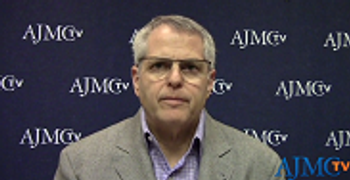
Oncology
Latest News
CME Content


With the US Food and Drug Administration busier than ever with breakthrough and priority review designations, and the rise of genetic-based treatments offering new hope for patients and families, the pressure is on oncologists to push the limits in care. But if it costs $200,000 to extend life just a few weeks, does that make sense? Are doctors having that conversation? When they do, are patients hearing it? These are the very issues that will be on the table in Baltimore Nov. 14-15 when The American Journal of Managed Care convenes experts from the front line.

As the government shutdown drags on, patients and providers are feeling the strain.

From the Physician Quality Reporting System's aim to boost quality measures reporting to the potential for accountable care organizations to transform care delivery, this brief sheds light on these and other key ACA provisions impacting cancer care.

Bruce Feinberg, DO, vice president and chief medical officer, Cardinal Health Specialty Solutions, says that the populations of Medicaid and commercial patients have historically been different.

In the final segment of the panel discussion, each panel member gave their final thoughts on the discussion topic.

In this segment, Dr Berger asked about errors in test result interpretation, as well as the problem of inconsistent testing. Panelists showed concern with unregulated direct-to-consumer testing.

It is up to physicians to seek education and training on genetics. Panelists agree that it is important for patients to speak with a genetic counselor even if it is over the phone.

Dr Berger asked the panel how both the June 2013 Supreme Court decision and the Angelina Jolie disclosure impacted genetic testing and counseling. After the Supreme Court's decision there was an influx of inexpensive and more comprehensive genetic tests available.

After introducing panelists, Otis Brawley, MD, chief medical officer, American Cancer Society, David H. Finley, MD, FACS, national medical officer, Enterprise Affordability and Policy, Cigna Healthcare, Joy Larsen-Haidle, MS, genetic counselor, Hubert H. Humphrey Cancer Center, Ellen T. Matloff, MS, research scientist, Department of Genetics, director, Cancer Genetic Counseling, Yale Cancer Center and Rebecca Nagy, president, National Society of Genetic Counselors, moderator, Jan Berger MD, MJ, president & CEO, Health Intelligence Partners, editor-in-chief, The American Journal of Pharmacy Benefits, asked the panel to identify the current unmet needs and challenges in genetic testing.

Not long ago, the range of options for a man diagnosed with prostate cancer was fairly narrow: surgery, radiation, or limited chemotherapy choices. Today, there are so many new therapies on the market, with so many possibilities for drug combinations and sequencing, that the questions for clinicians are complex: It's not just which therapy or which drug, but for how long and when do you switch?

Remedies needed: Better palliative care, patient-centered approach

In this pilot study, primary care providers refer patients to a telephone counselor who provides education about colorectal cancer screening and performs motivational interviewing as needed to promote screening.

Panelists all agree that there needs to be evidence and guidelines for both payers and providers. There are not enough resources to try every drug on every patient. Although it will be costly, there needs to be evidence on putting these drugs together as combinations.

Dr Crawford said that in order to pick the appropriate treatment for a diagnosed patient with prostate cancer, it is important to think outside of the box. The National Comprehensive Cancer Network (NCCN) and the American Urological Association (AUA) offer castration-resistant prostate cancer (CRPC) guidelines that serve as the best guideline for payers.

It is an exciting time for prostate cancer due to the growth in new treatments. Dr George said that it is, in fact, both exciting and daunting to have all of these new agents being developed. Currently, there is a shortage in data for practitioners in using the new agents in sequence or combination.

In this segment of the panel discussion, Dr Fendrick asks the panelists if there is now a sense of optimism in reducing the mortality and quality gaps in prostate cancer treatment due to targeted screening and new molecular diagnostics, and immunotherapies.

The ability to treat cancer in a growingly aging population is reaching a near crisis level in the healthcare community.

Dr George notes that in an ideal world a multidisciplinary clinic would not be necessary. Multidisciplinary clinics deliver the tools to practitioner to make the best decisions for their patients.

In this segment, panelists examine prostate cancer treatment as a model for team-based approach. Panelists agree that there is a need for a multidisciplinary approach to care. There

Cancer treatment has grown so complex, many U.S. doctors can't keep up with new information and are offering incorrect treatment, failing to explain options and leaving patients to coordinate their own care.

Coping with advanced cancer, Bev Veals was in the hospital for chemo this summer when she got a call that her health plan was shutting down. Then, the substitute insurance she was offered wanted her to pay up to $3,125, on top of premiums.

Healthcare reform will bring new payment models and new power for consumers, and cancer care delivery will not be immune. With that in mind, The American Journal of Managed Care will bring together experts from the front lines to Baltimore, Maryland, November 14-15 for a conference to share how the goals of better care, savings and fair compensation can be achieved, even in the world of oncology.

A new study from The American Journal of Pharmacy Benefits finds that physicians who treat cancer patients may be influenced by the reimbursement policies of the Medicare claim processors that pay them.

Adhering to the best practices in cancer care may be the answer many oncologists have been looking for, at least according to one hospital's findings.





